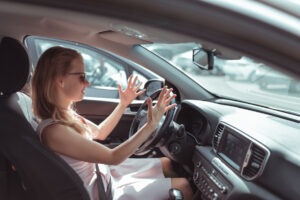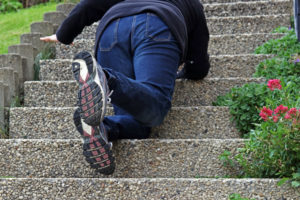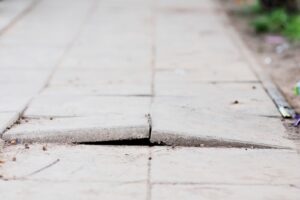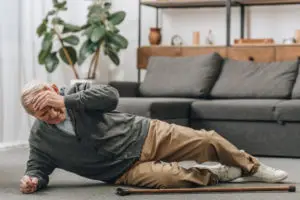
According to a 2019 study, the number of seniors who are dying after suffering a fall is on the rise. This is disappointing news. Especially since slip and falls are already an issue for our elderly population as their eyesight, balance, muscle strength, and blood pressure declines. But when negligence causes an elderly fall, it is often costly, sometimes deadly, and always infuriating for the victim and their family.
The referenced study, by the medical journal JAMA, concluded that the mortality rate of fallen seniors over the age of 75 has more than doubled since 2000.
In the year 2000, 52 seniors died for every 100,000 who fell. But in 2016, 111 died for every 100,000 who fell.
This study brings up an obvious question: why?
Well, the study wasn’t conclusive. But one possible reason is that seniors are continuing to live longer with conditions they would have died from sooner in the past. Another possible contributing factor could be that seniors are on more medications than ever, lots of which cause a loss of balance.
This study reiterates what slip & fall attorneys see all the time: falls kill.
If you ask someone what the first thing they think of when they imagine someone slipping and falling, you might hear “funny”. But the fact is, falling, especially for seniors, is no laughing matter.
If that fall could have been prevented and the injuries avoided—whether that be a spilled that could have been mopped up, a handrail that could have been tightened, or a hall light in a nursing home that could have been turned on—the situation becomes all the more frustrating.
At Viles & Beckman, we understand that falling is no laughing matter. Negligent parties should be held responsible for their actions and we seek to do just that. If you or a loved one suffered a slip and fall due to another’s negligence, contact us today for a free case evaluation.
[More Resources: What To Do After a Slip and Fall Accident]
Tips for Preventing Slip and Falls for the Elderly
Since age cannot be changed, the only other thing an aging senior can do is be more careful and mindful of their surroundings. Some simple preventative measures could make all the difference between being safe and risking a life-threatening fall.
Exercising Can Prevent Falls
Exercise is becoming more and more important in our daily lives as our increasingly sedentary lifestyle catches up with us. But for seniors, exercise is even more important, especially for keeping safe.
If it is not already, incorporating exercise into your daily routine is a great way for seniors to be healthier, live longer, and gain back muscle and balance that it takes to mitigate a serious slip an fall. Doctors recommend that seniors age 65 and older should aim for at least 2.5 hours of moderate exercise each week. This could be brisk walking, light aerobics, light weightlifting, swimming, or any other activity that gets the heart rate up and the body moving.
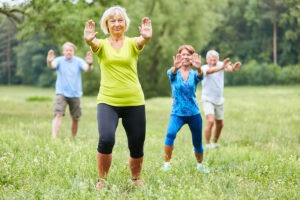
According to an article on the subject published by NYT, seniors who practiced tai chi at least twice a week for an hour were 58% less likely to suffer a fall.
For those of us who are worried about our loved ones—or about our own personal safety—a near 60% reduction from an simple and effective activity is a bargain.
Prevent Falls by Being Aware of What You Wear
Most of never have to give too much thought to how our outfit choices and accessories affect our safety. But as an aging senior, it is a good idea to give this area of life some thought.
For example, bifocal or progressive lenses can create a serious tripping hazard for certain populations with decreased balance. As you move around, bifocals or progressive lenses can seriously affect your depth perception, making stairs, stepping off a curbs, or walking over a threshold go from an innocuous activity to a hazard.
If you have balance issues and are prescribed bifocals or progressive lenses, speak to your ophthalmologist about different options.
Another potential danger to seniors falling is footwear. Sandals, heels, and anything that is not secured to the foot or creates added height can become a hazard for those who are getting into their golden years.
If you feel balance is an issue for you, it may be time to consider shoes that are well-fitting and flat. There are plenty of shoes out there that meet these requirements without giving up style.
Knowing Your Medication’s Side Effects Can Prevent Falls
Medications have a ton of side effects that cause all kinds of issues. But the idea is that the good out ways the bad. Certain medications, like those for sleep, blood pressure, or mood disorders, can have specific side effects that may make one more susceptible to a dangerous fall.
Additionally, our metabolism slows down as we age, causing medications to effect us in unique ways that it may not have in our youth. So if you are taking any medications that you are not sure about, check with your doctor about their side effects. You could find that something you are taking may be responsible for you loss of balance. Changing medication or even simply taking them at a different time may help prevent a fall and keep you safe.
Eliminating Tripping Hazards Could Save Your Life
Many older people live in a house that has been in their family for a long time. This can lead to an accumulation of stuff that may present a tripping hazard.
If you are finding it more difficult to get around as you age, it may be time to consider your surroundings and pathways through your home.
Pay special attention to rugs, power cords, furniture that is walked around. It may be time to consider giving one of your kids that marble coffee table they always wanted.
Speaking Up May Prevent a Fall for You or Others
Some of the most common situations that cause falls, especially for seniors, are easily preventable hazards. If you live in an area that has public spaces, like a nursing home or apartment building, speak up if you see something that could be dangerous.
For example, if a walkway is too dark, speak to the property manager about adding a light or replacing the bulb. If you see a spill in your nursing home’s cafeteria, speak up and let someone know. If your sidewalk collects water during a rain storm, insist that someone fixes it.
These types of hazards cause families more suffering than they should. Easily preventable hazards, such as things that can be fixed, moved, or cleaned up, are just that, easily preventable, and those who have taken on the responsibility of property ownership have a responsibility to address them.
As more seniors find themselves in life-threatening situations after a fall, these simple steps could make all the difference in saving a life. Some of them may sound simple, but it’s often the simple things that are ignored and end up creating the biggest hazards.
Contact the Slip and Fall Lawyers at Viles & Beckman
Slip and falls are a big problem for aging seniors. And as the above study suggests, somehow it is getting worse. Following a few simple tips could help prevent a costly and dangerous slip and fall and put families at a little ease.
If you or a loved one was injured due to a slip and fall that was caused by negligence, we can help. Our experienced team of lawyers has handled hundreds of cases involving slip and falls and understand the intricacies and complications involved.
We will be happy to sit down with you and explain your rights and options in a free consultation. Contact our office by calling (239) 334-3933 or by filling out our online contact form. We look forward to speaking with you.
About the Author of this Page: The above information was written or reviewed by one of the attorneys at Viles & Beckman LLC who have a combined experience of nearly 60 years: Marcus Viles, Michael Beckman. The information provided in this article comes from years of experience trying legal cases outside and inside courtrooms throughout Florida along with extensive research.

